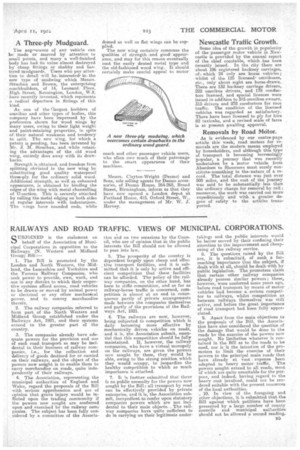RAILWAYS AND ROAD TRAFFIC. VIEWS OF MUNICIPAL CORPORATIONS.
Page 9

If you've noticed an error in this article please click here to report it so we can fix it.
SURTOINED is the statement on behalf of the Association of Mimicipal Corporations in opposition to the Railways (N. 'Western and Midland Group) Bill :
1. The Bill is promoted by the London and North Western, the .Midland, the LancaShire and Yorkshire and the Furness Railway Companies, who seek power to provide, own work, and use in any district to which their respective systems afford access, road vehicles to be drawnor moved by animal power or electrical or any other mechanical power, and to convey merchandise therein.
2. The railway companies referred to form part of the North Western and Midland Group established under the Railways Act, 1921, and their systems extend to the greater part of the country.
. 3. The companies already have adequate powers for the provision and use of such road transport as may be incidental to their business of railway companies, i.e.,, for the collection and delivery of goods destined for or carried on their railways, and the object of the powers now sought, is to enable them to carry merchandise on roads, quite independently of their railways.
• 4. The Association, representing, the municipal authorities of England and Wales, regard the proposals of the Bill with serious apprehension and are of epinion that grave injury would be inflicted upon the trading community if the powers now sought. are conferred upon and exercised b the railway comf panies. The subject has been fully considered by a committee of the Associa
tion and on two occasions by the -Council, who are of opinion that in the public interests the Bill should not be allowed to pass into law.
5. The prosperity of the country is dependent•largely upon cheap and effective transport facilities, and it is submitted that it is only by active and efficient competition that these facilities can be afforded. The policy of the railway companies, on the other hand, has been to stifle competition, and so far as railway-borne traffic is concerned, competition is almost at an end in consequence partly of private arrangements made between the companies themselves and partly of the provisions of the Railways Act, 1921, 6. The railways are now, however, being subjected to competition which is daily becoming more effective by mechanically driven vehicles on roads, and it is, the Association submit, essential that this competition should be fully maintained. If, however, the railway companies, who have a virtual monopoly on the railways, are given the powers now sought by them, they would be able, owing to the strong position which they would. occupy, to jeopardise the healthy competition to which so much importance is attached.
7. It ;s further submitted that there is no public necessity for the powers now sought by the Bill; all transport by road can be effectively provided by private i
enterprise, and it s, the Association submit, inexpedient to confer upon statutory companies powers which are not incidental to their main objects. The railway companies have -quite sufficient to do in carrying on their legitimate under
takings and the public interests would be better served by their confining their attention to the improvement and cheapening of the railway service.
8. The questions, raised by the Bill are, it is submitted, of such a farreaching importance that the subject, if dealt with at all, should be dealt with by public legislation. The promoters claim that certain other railway companies already possess similar powers ; these, however, were conferred some years ago, before road transport by means of motor vehicles had -become a serious competitor to railways, whilst competition as between railways themselves was still active, and before the great importance of road transport had been fully appreciated.
9. -Apartfrom the main objections to the proposals of the Bill, the Association have also considered the question of the damage that would be done to the roads bv the exercise of the powers now sought. No limitation whatever is contained in the Bill as to the roads to be used, nor is it the intention of the promoters to limit the exercise of their powers to the principal main roads that have already at vast expense been adapted to heavy motor traffic. The powers sought extend to all roads, most of which are quite unsuitable for the purpose, and indeed, having regard to the heavy cost involved, could not be rendered suitable with the present resources of the local authorities.
„ 10. In view of the foregoing and other objections, it, is submitted that the Bill against which petitions have been presented by a large number of county councils and municipal authorities should not be allowed a second reading.
































